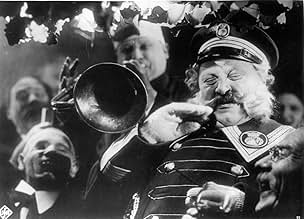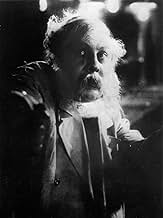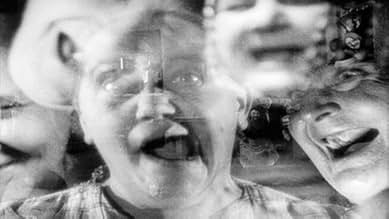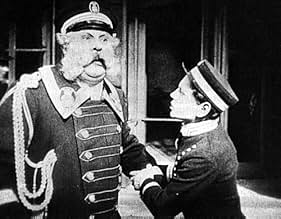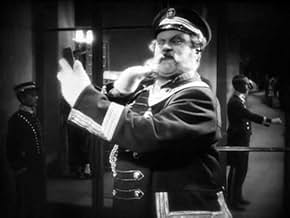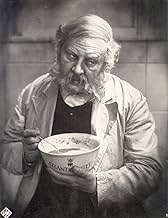VALUTAZIONE IMDb
8,0/10
16.002
LA TUA VALUTAZIONE
Aggiungi una trama nella tua linguaAn aging doorman is forced to face the scorn of his friends, neighbors and society after being fired from his prestigious job at a luxurious hotel.An aging doorman is forced to face the scorn of his friends, neighbors and society after being fired from his prestigious job at a luxurious hotel.An aging doorman is forced to face the scorn of his friends, neighbors and society after being fired from his prestigious job at a luxurious hotel.
- Regia
- Sceneggiatura
- Star
- Premi
- 2 vittorie totali
O.E. Hasse
- Small Role
- (non citato nei titoli originali)
Harald Madsen
- Wedding Musician
- (non citato nei titoli originali)
Neumann-Schüler
- Small Role
- (non citato nei titoli originali)
Carl Schenstrøm
- Wedding Musician
- (non citato nei titoli originali)
Erich Schönfelder
- Small role
- (non citato nei titoli originali)
Recensioni in evidenza
Although the Golden Twenties of German cinema, a golden age corresponding approximately to the era from the making of The Cabinet of Dr. Caligari in 1919 to Hitler's absorption of the German film industry for the purposes of the Nazi regime, has come to be widely associated in public consciousness with the grotesque, the mystical and the fantastic of German Expressionism, indeed with such iconic figures to spearhead it as Nosferatu, the Somnabulist, Dr. Caligari, Mephisto and the Golem, all of them having their roots in the folklore or a fantastic reimagined past, there was also a more realistic, if no less tragic, depiction of a middle-class present with a focus on a psychological, as opposed to metaphysical, aspect.
By 1924 the acceptance of the Dawes Plan by Germany had lulled the German Republic into a sense of economic stability that was to last until the stock market crash in 1929. It was that same stability that most hurt the German film industry, as the Dawes Plan imposed the reduction of all exports, leaving many independent production companies without foreign markets for their product. In the years to come Hollywood would seize this unique financial opportunity to break down its only European rival, but before major box-office flops like Fritz Lang's epic rendition of Die Nibelungen (1924) and Metropolis (1927) and FW Murnau's Faust (1926) would bring UFA to its proverbial knees in debt to German banks, little films like The Last Laugh (1924) and Varieté (1925) were the toast of the town in both sides of the Atlantic.
Emil Jannings plays an aging hotel porter who takes great pride and pleasure in his job and especially the lavish uniform that comes with it. In the miserable middle-class neighborhood he lives, being able to wake up in the morning and go to work dressed like in such a prestigious uniform is like being a general. That is until a younger man is hired in his place and he's demoted to the, undignified in his mind, job of lavatory attendant. Not bearing to lose face back home with gossiping neighbors and relatives, the old porter steals back his uniform and returns home as if nothing happened, the uniform a symbol not only of his social status but also of purpose in life.
What is most striking about The Last Laugh is the way Murnau externalizes the psychological in a grand, theatric way that could only work on stage and in silent cinema. Watch for example the look of pure anguish and horror in Janning's face when he's asked to turn in his uniform, stripping it off like he's being skinned alive. Recoiling without it into a state of defeat and abandonment like a man stripped of his own identity, with nothing to live for.
Obsessed with artistic control and exercising complete authority over the minutest details of lighting and décor, German directors pushed for an increasingly studio-bound cinema to the point that UFA in the years between 1919 and 1927 became the best equipped movie studio in the western world. The Last Laugh is no exception. The facades of apartment blocks in the background with light slanting over them, the low-class neighborhood, the busy street in front of the hotel, all of them replicated in great detail within studio limits. It's within this geography that Murnau transposes Jannings' internal world. As is proper for the inward journey of the self the protagonist faces, the aging porter starts at the busy front of the hotel only to find himself exiled in the dark bowels of the basement where he remains hidden, that is until the film's tacked-on happy ending.
The only false note in an otherwise perfect film is the happy ending Murnau and scriptwriter Carl Mayer (of Caligari fame) were forced to devise by UFA executives anxious for the box office success of their movie. It's not that it doesn't work because such a tragic tale precludes a happy ending, after all one of the most memorable endings in all cinema is that of Capra's It's a Wonderful Life and it doesn't get any more saccharine than that, but because it happens in such a tacked-on deus-ex-machina fashion that it feels like a complete cop-out. It's lame now and it was lame then and Murnau no doubt understood that as he flashes a title card (the only title card in the film) more or less apologizing that "that's how the movie would've ended if I didn't have a boss to keep happy so here's a they-lived-happily-ever-after epilogue, take it with a pinch of salt or ignore it altogether". It's noteworthy however that it's not pure schmaltzy tripe. It feels as though Murnau is taking a perverse, vulgar pleasure in delivering what was asked of him.
Exceptionally photographed, with a modern feel to Murnau's camera-work that places it well ahead of its time compared to other silents, a great example of purely visual storytelling without the cumbersome crutches of the title cards, The Last Laugh stands not only as a triumph of Weimar cinema but as masterpiece almost 100 years later.
By 1924 the acceptance of the Dawes Plan by Germany had lulled the German Republic into a sense of economic stability that was to last until the stock market crash in 1929. It was that same stability that most hurt the German film industry, as the Dawes Plan imposed the reduction of all exports, leaving many independent production companies without foreign markets for their product. In the years to come Hollywood would seize this unique financial opportunity to break down its only European rival, but before major box-office flops like Fritz Lang's epic rendition of Die Nibelungen (1924) and Metropolis (1927) and FW Murnau's Faust (1926) would bring UFA to its proverbial knees in debt to German banks, little films like The Last Laugh (1924) and Varieté (1925) were the toast of the town in both sides of the Atlantic.
Emil Jannings plays an aging hotel porter who takes great pride and pleasure in his job and especially the lavish uniform that comes with it. In the miserable middle-class neighborhood he lives, being able to wake up in the morning and go to work dressed like in such a prestigious uniform is like being a general. That is until a younger man is hired in his place and he's demoted to the, undignified in his mind, job of lavatory attendant. Not bearing to lose face back home with gossiping neighbors and relatives, the old porter steals back his uniform and returns home as if nothing happened, the uniform a symbol not only of his social status but also of purpose in life.
What is most striking about The Last Laugh is the way Murnau externalizes the psychological in a grand, theatric way that could only work on stage and in silent cinema. Watch for example the look of pure anguish and horror in Janning's face when he's asked to turn in his uniform, stripping it off like he's being skinned alive. Recoiling without it into a state of defeat and abandonment like a man stripped of his own identity, with nothing to live for.
Obsessed with artistic control and exercising complete authority over the minutest details of lighting and décor, German directors pushed for an increasingly studio-bound cinema to the point that UFA in the years between 1919 and 1927 became the best equipped movie studio in the western world. The Last Laugh is no exception. The facades of apartment blocks in the background with light slanting over them, the low-class neighborhood, the busy street in front of the hotel, all of them replicated in great detail within studio limits. It's within this geography that Murnau transposes Jannings' internal world. As is proper for the inward journey of the self the protagonist faces, the aging porter starts at the busy front of the hotel only to find himself exiled in the dark bowels of the basement where he remains hidden, that is until the film's tacked-on happy ending.
The only false note in an otherwise perfect film is the happy ending Murnau and scriptwriter Carl Mayer (of Caligari fame) were forced to devise by UFA executives anxious for the box office success of their movie. It's not that it doesn't work because such a tragic tale precludes a happy ending, after all one of the most memorable endings in all cinema is that of Capra's It's a Wonderful Life and it doesn't get any more saccharine than that, but because it happens in such a tacked-on deus-ex-machina fashion that it feels like a complete cop-out. It's lame now and it was lame then and Murnau no doubt understood that as he flashes a title card (the only title card in the film) more or less apologizing that "that's how the movie would've ended if I didn't have a boss to keep happy so here's a they-lived-happily-ever-after epilogue, take it with a pinch of salt or ignore it altogether". It's noteworthy however that it's not pure schmaltzy tripe. It feels as though Murnau is taking a perverse, vulgar pleasure in delivering what was asked of him.
Exceptionally photographed, with a modern feel to Murnau's camera-work that places it well ahead of its time compared to other silents, a great example of purely visual storytelling without the cumbersome crutches of the title cards, The Last Laugh stands not only as a triumph of Weimar cinema but as masterpiece almost 100 years later.
This classic is distinctive in several respects. The expressionistic style and creative camera work, along with a noteworthy leading performance by Emil Jannings, turn a simple story into a thought-provoking experience. It is also very interesting for its almost complete lack of title cards, demonstrating how a skilled practitioner of the art of silent cinema can convey all kinds of attitudes and emotions without employing dialogue of any kind.
The actual story is very simple. Jannings portrays a doorman at a fine hotel, who takes enormous pride in his position, his work, and especially his uniform. One day the hotel manager passes by, misunderstands what he sees, and decides that the doorman is too old for the job. The next day, a new doorman takes his place, and he is relegated to working in the washroom. The rest of the film then shows the effect of this change on the doorman and on the way that others view him and treat him. The plot developments themselves are conveyed efficiently and succinctly, so that the emphasis is on the feelings and perceptions of the characters. The acting, camera work, and settings are all used very carefully to emphasize the changes that take place inside Jannings' character and in the attitudes of others towards him as a result of his demotion.
These changes are often very (deliberately) exaggerated, and there are times when they honestly strain credibility a bit too much. And it is not always easy to watch the doorman's anguish, but it gives you plenty to think about - part of his suffering comes from the foolish attitudes of others, but much of it also comes from his own over-dependence on his position for his happiness. It is remarkable how much is expressed without even using title cards - there is just one in the entire movie, a note that introduces the last part of the film, when further developments occur that introduce a new set of themes.
"The Last Laugh" is worth seeing for anyone who likes silent films, for its thought-provoking story and perhaps even more so for its creative and masterful use of silent film techniques.
The actual story is very simple. Jannings portrays a doorman at a fine hotel, who takes enormous pride in his position, his work, and especially his uniform. One day the hotel manager passes by, misunderstands what he sees, and decides that the doorman is too old for the job. The next day, a new doorman takes his place, and he is relegated to working in the washroom. The rest of the film then shows the effect of this change on the doorman and on the way that others view him and treat him. The plot developments themselves are conveyed efficiently and succinctly, so that the emphasis is on the feelings and perceptions of the characters. The acting, camera work, and settings are all used very carefully to emphasize the changes that take place inside Jannings' character and in the attitudes of others towards him as a result of his demotion.
These changes are often very (deliberately) exaggerated, and there are times when they honestly strain credibility a bit too much. And it is not always easy to watch the doorman's anguish, but it gives you plenty to think about - part of his suffering comes from the foolish attitudes of others, but much of it also comes from his own over-dependence on his position for his happiness. It is remarkable how much is expressed without even using title cards - there is just one in the entire movie, a note that introduces the last part of the film, when further developments occur that introduce a new set of themes.
"The Last Laugh" is worth seeing for anyone who likes silent films, for its thought-provoking story and perhaps even more so for its creative and masterful use of silent film techniques.
F. W Murnau works are rare things - he made very few compared to other directors of his day, and many of those he did make have been lost. The reason he made so few can perhaps be understood by watching The Last Laugh. Like Chaplin, Kubrick and Leone, the effort that went into a single picture was the same effort another director might spread across ten. Nosferatu, his famous Dracula story, is great, and i hear his Faust and Sunrise are also things to behold - but many regard "The Last Laugh" as his masterwork, and also one of the greatest movies of all time. Lillian Gish once said that she never approved of the talkies - she felt that silents were starting to create a whole new art form. She was right, but the proof of this can not be seen in the work of Griffith, who was her frequent collaborator, and who she probably was thinking about when she made this statement - but in the work of German director F. W Murnau.
D. W Griffith is usually shunned for his stance on racial issues and praised for his abilities as an influential film artist. I believe he doesn't deserve this praise - and this movie is why. Not only was Griffith about as subtle as a migraine, but watching a Griffith silent, you get more words than images. There's a title card telling you what is about to happen in every image before it does. The images themselves are almost unnecessary - his style is more literary than cinematic. The difference between watching Griffith's Intolerance and watching F. W Murnau's The Last Laugh is like the difference between watching a silent comedy by Hal Roach and one by Charlie Chaplin. The latter of each pair (Murnau and Chaplin) were visualists and artists, using few words, constructing beauty and high emotion through seemingly simple situations (a tramp who discovers a lost child, or a hotel doorman who loses his job, which is the basis of The Last Laugh).
Silent directors strove to and were praised for their ability to tell stories through images alone, as much as possible, and this is one of the reasons silent cinema reached its pinnacle in F. W Murnau's The Last Laugh - which tells the story of a proud hotel doorman (Emil Jennings), who, after many years of service, is demoted from his position to a mens' bathroom attendant. Murnau tells an incredibly sensitive and human tale, showing how much the job meant to him by having him go to work instead of going to his daughter's wedding. He shows how the position made him respected in his neighbourhood, and how he could not face the neighbourhood without his doorman's uniform. And he tells the story almost entirely through images.
There are no title cards telling us what the images are - they are allowed to speak for themselves. The few words used are worked in through letters and signs. Many silent directors cheated and used title cards to explain the images, but only in this movie did the art form of silent movies, which Lillian Gish refers to, take shape.
I was amazed at the level of depth and emotional complexity that Murnau was capable of conveying without resorting to title cards (or their equivalent in talkies, the voice-over). This movie is also notable for its brilliant use of expressionism, and the first brilliant use of a tracking shot. In Murnau's The Last Laugh, silent movies metaphorically were given movement, and learned to run.
D. W Griffith is usually shunned for his stance on racial issues and praised for his abilities as an influential film artist. I believe he doesn't deserve this praise - and this movie is why. Not only was Griffith about as subtle as a migraine, but watching a Griffith silent, you get more words than images. There's a title card telling you what is about to happen in every image before it does. The images themselves are almost unnecessary - his style is more literary than cinematic. The difference between watching Griffith's Intolerance and watching F. W Murnau's The Last Laugh is like the difference between watching a silent comedy by Hal Roach and one by Charlie Chaplin. The latter of each pair (Murnau and Chaplin) were visualists and artists, using few words, constructing beauty and high emotion through seemingly simple situations (a tramp who discovers a lost child, or a hotel doorman who loses his job, which is the basis of The Last Laugh).
Silent directors strove to and were praised for their ability to tell stories through images alone, as much as possible, and this is one of the reasons silent cinema reached its pinnacle in F. W Murnau's The Last Laugh - which tells the story of a proud hotel doorman (Emil Jennings), who, after many years of service, is demoted from his position to a mens' bathroom attendant. Murnau tells an incredibly sensitive and human tale, showing how much the job meant to him by having him go to work instead of going to his daughter's wedding. He shows how the position made him respected in his neighbourhood, and how he could not face the neighbourhood without his doorman's uniform. And he tells the story almost entirely through images.
There are no title cards telling us what the images are - they are allowed to speak for themselves. The few words used are worked in through letters and signs. Many silent directors cheated and used title cards to explain the images, but only in this movie did the art form of silent movies, which Lillian Gish refers to, take shape.
I was amazed at the level of depth and emotional complexity that Murnau was capable of conveying without resorting to title cards (or their equivalent in talkies, the voice-over). This movie is also notable for its brilliant use of expressionism, and the first brilliant use of a tracking shot. In Murnau's The Last Laugh, silent movies metaphorically were given movement, and learned to run.
Warning - Possible spoilers lie within.
This is the first silent movie I have watched in its entirety, having previously found myself becoming restless and distracted, I normally find them quite difficult to watch. I came across the Criterion edition of the movie in a large collection of Laserdiscs that I purchased recently, and decided to give it a try. I was speechless.
'The Last Laugh' (or 'The Last Man', as its translation would lead you to believe, is a touching story from director F.W. Murnau about an un-named Hotel Porter & Doorman (played excellently by Emil Jannings) who, through no fault of his own, is demoted to Lavatory attendant, and we hereby watch as his life collapses around him. It's an incredibly emotional story - during his downfall, as his friends and family mock him, Jannings' depressed, hunched-over figure can be painfully sad to watch. I found myself filling up in the scene when he finally hands his beloved porter's uniform over to the night watchman.
A landmark in the era of silent films, Murnau used some very clever camera tricks (such as smearing vaseline on the camera lens for 'dream' sequences). It was also one of the first films to use a completely free moving camera with no tripod, testimony to the success of this can be seen immediately in the first scene as the film starts. There are also no title cards in the film. Nor are they needed - The story is carried perfectly by the actors and on no occasion do you feel that you don't know what is going on.
I won't give anything away here, but there are some people that may feel the ending is a little out of place - However, I had grown so fond on Jannings' character that in a way, I was relieved to see the film move on from the final scene where he is sat hunched on the seat in the washroom - and for him to finally have 'The Last Laugh' so to speak :o)
If you have any interest in old cinema, and have not seen this, or just fancy a change from all of the samey Hollywood flicks being churned out right now, I suggest you hunt out a copy right away. Highly recommended.
This is the first silent movie I have watched in its entirety, having previously found myself becoming restless and distracted, I normally find them quite difficult to watch. I came across the Criterion edition of the movie in a large collection of Laserdiscs that I purchased recently, and decided to give it a try. I was speechless.
'The Last Laugh' (or 'The Last Man', as its translation would lead you to believe, is a touching story from director F.W. Murnau about an un-named Hotel Porter & Doorman (played excellently by Emil Jannings) who, through no fault of his own, is demoted to Lavatory attendant, and we hereby watch as his life collapses around him. It's an incredibly emotional story - during his downfall, as his friends and family mock him, Jannings' depressed, hunched-over figure can be painfully sad to watch. I found myself filling up in the scene when he finally hands his beloved porter's uniform over to the night watchman.
A landmark in the era of silent films, Murnau used some very clever camera tricks (such as smearing vaseline on the camera lens for 'dream' sequences). It was also one of the first films to use a completely free moving camera with no tripod, testimony to the success of this can be seen immediately in the first scene as the film starts. There are also no title cards in the film. Nor are they needed - The story is carried perfectly by the actors and on no occasion do you feel that you don't know what is going on.
I won't give anything away here, but there are some people that may feel the ending is a little out of place - However, I had grown so fond on Jannings' character that in a way, I was relieved to see the film move on from the final scene where he is sat hunched on the seat in the washroom - and for him to finally have 'The Last Laugh' so to speak :o)
If you have any interest in old cinema, and have not seen this, or just fancy a change from all of the samey Hollywood flicks being churned out right now, I suggest you hunt out a copy right away. Highly recommended.
F.W Murnau is best known for his expressionistic horror movies, such as 'Nosferatu' and the excellent 'Faust'. This movie is somewhat different from those, as it's a more personal and down to earth sort of tale. Still, despite this not being a member of the horror genre; Murnau's style still allows for much of the great visuals that made his horror movies great. The story itself has definite horror elements, which although they don't involve vampires or the devil; are arguably more frightening, as it dictates and event that could well happen to anyone. The film tackles the idea of 'downfall', and as the prologue states; one can be a prince one day, but what is he tomorrow? This tale is told through the story of a hotel porter that has worked hard all his life but loses his job through incredible bad luck when the manager catches him taking a break. Heartbroken and humiliated, our hero is offered another job; but it only allows for his humiliation to continue, as the job is that of a lowly bathroom attendant. We then follow his struggle as he comes to terms with his loss and the reaction of his family and neighbours.
F.W. Murnau uses no story cards for this silent film, which shows his flair for storytelling. Imagining some of today's 'great' filmmakers telling a story without dialogue is preposterous, but Murnau shows his prowess by doing just that, and doing it down to a fine art. People often cite 'Citizen Kane' for being the film that took storytelling to the next level, and although it did do that; surely some of the credit has to go to F.W. Murnau. This film features what is perhaps the first ever fantasy sequence, a sequence that is, of course, a favourite of today's cinema. Murnau's technical mastery is also shown in many other sequences, including one in particular that sees a scene appear in the middle of a letter. It's quite unbelievable that this was made over eighty years ago, just due to the amazing work on show in the film.
The film falls down a bit towards the end, because of an ill-advised twist. This was put upon F.W. Murnau by the studio releasing the film, who wanted a happy ending. This is just another example of a studio spoiling a great movie, and even before I saw that piece of information in the trivia section for this movie; it was evident to me that it isn't the way that Murnau wanted to take the story from the way it almost appeared to be tacked on to the end of the film. Still, the hour and ten minutes running up the ending are almost as good as silent cinema gets, and in spite of the studio's best efforts to ruin it; The Last Laugh stands tall as on of Murnau's finest films.
F.W. Murnau uses no story cards for this silent film, which shows his flair for storytelling. Imagining some of today's 'great' filmmakers telling a story without dialogue is preposterous, but Murnau shows his prowess by doing just that, and doing it down to a fine art. People often cite 'Citizen Kane' for being the film that took storytelling to the next level, and although it did do that; surely some of the credit has to go to F.W. Murnau. This film features what is perhaps the first ever fantasy sequence, a sequence that is, of course, a favourite of today's cinema. Murnau's technical mastery is also shown in many other sequences, including one in particular that sees a scene appear in the middle of a letter. It's quite unbelievable that this was made over eighty years ago, just due to the amazing work on show in the film.
The film falls down a bit towards the end, because of an ill-advised twist. This was put upon F.W. Murnau by the studio releasing the film, who wanted a happy ending. This is just another example of a studio spoiling a great movie, and even before I saw that piece of information in the trivia section for this movie; it was evident to me that it isn't the way that Murnau wanted to take the story from the way it almost appeared to be tacked on to the end of the film. Still, the hour and ten minutes running up the ending are almost as good as silent cinema gets, and in spite of the studio's best efforts to ruin it; The Last Laugh stands tall as on of Murnau's finest films.
Lo sapevi?
- QuizThe first "dolly" (a device that allows a camera to move during a shot) was created for this film. According to Edgar G. Ulmer, who worked on the film, the idea to make the first dolly came from the desire to focus on Emil Jannings' face during the first shot of the movie, as he moved through the hotel. They obviously didn't know how to make a dolly technically, so they created the first one out of a baby's carriage. They then pulled the carriage on a sort of railway that was built in the studio.
- BlooperWhen the porter comes home with the stolen coat, the third button down (which fell off earlier) is still there until a close-up of him at the door.
- Versioni alternativeThere is an Italian edition of this film on DVD, re-edited in double version (1.33:1 and 1.78:1) with the contribution of film historian Riccardo Cusin. This version is also available for streaming on some platforms.
- ConnessioniEdited into Germania nove zero (1991)
I più visti
Accedi per valutare e creare un elenco di titoli salvati per ottenere consigli personalizzati
- How long is The Last Laugh?Powered by Alexa
Dettagli
Botteghino
- Lordo Stati Uniti e Canada
- 94.812 USD
- Tempo di esecuzione1 ora 28 minuti
- Colore
- Mix di suoni
- Proporzioni
- 1.33 : 1
Contribuisci a questa pagina
Suggerisci una modifica o aggiungi i contenuti mancanti


